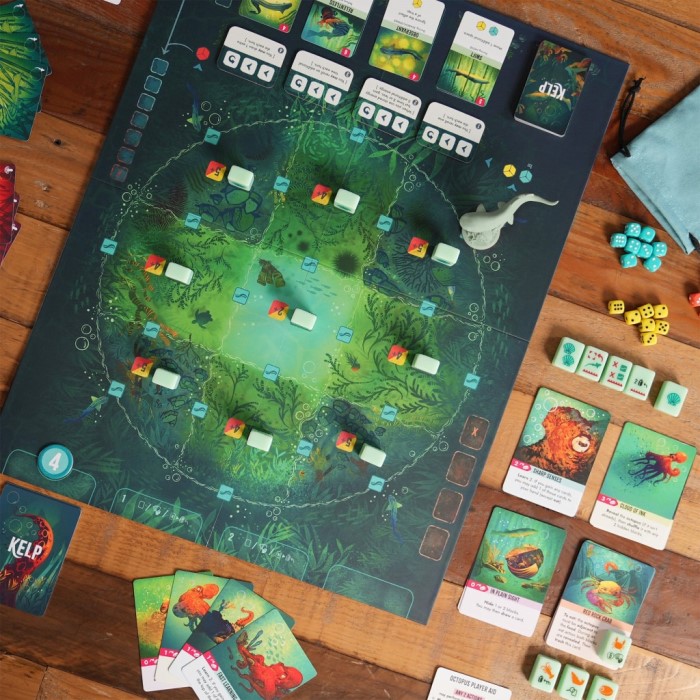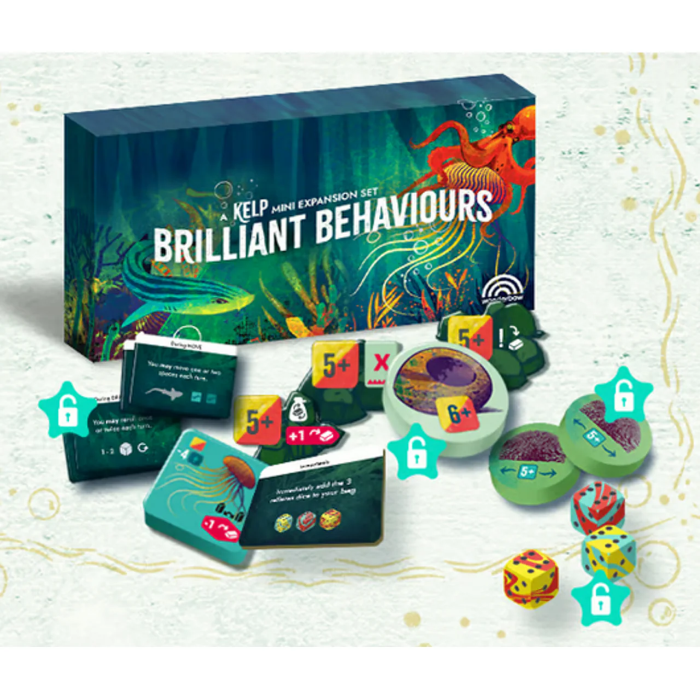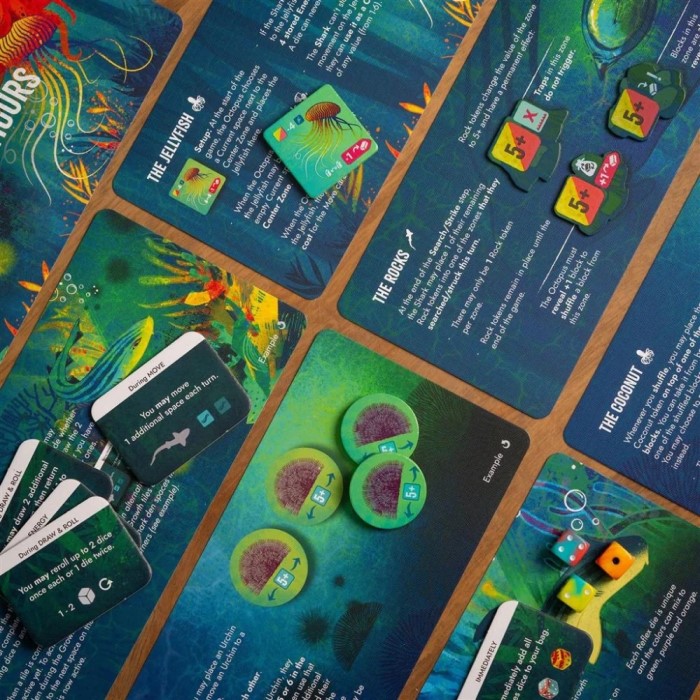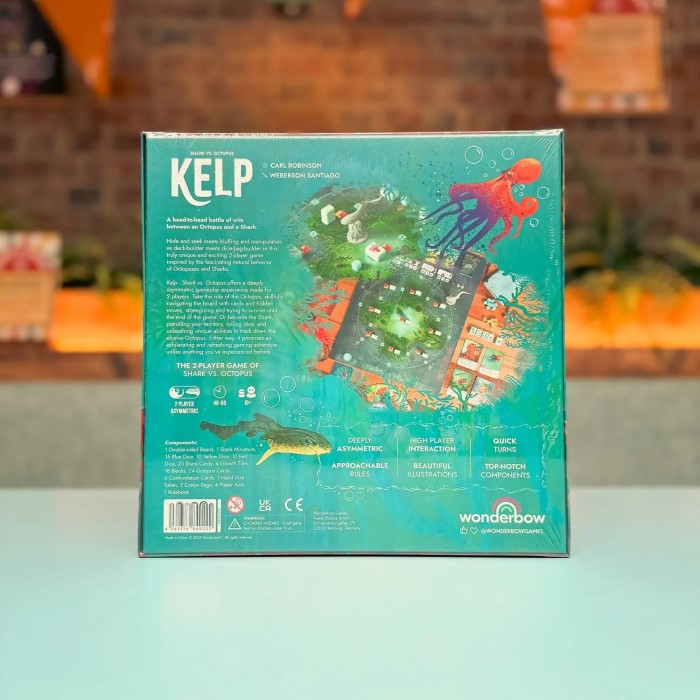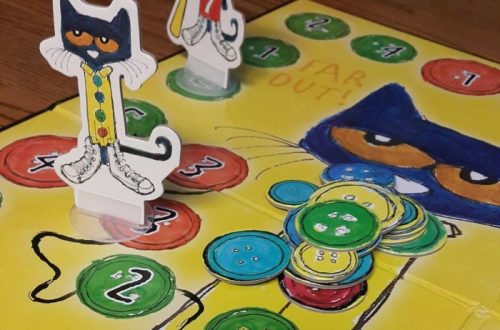Overview of the Kelp Board Game
What is the Kelp Board Game?
The Kelp Board Game is a strategic tabletop game inspired by underwater ecosystems. Players immerse themselves in a rich oceanic adventure, maneuvering their way through challenges of control and resource management. The game encourages critical thinking, as players build strategies and adapt to dynamic situations. Designed for both casual players and hardcore strategists, Kelp offers engaging gameplay for a diverse audience.
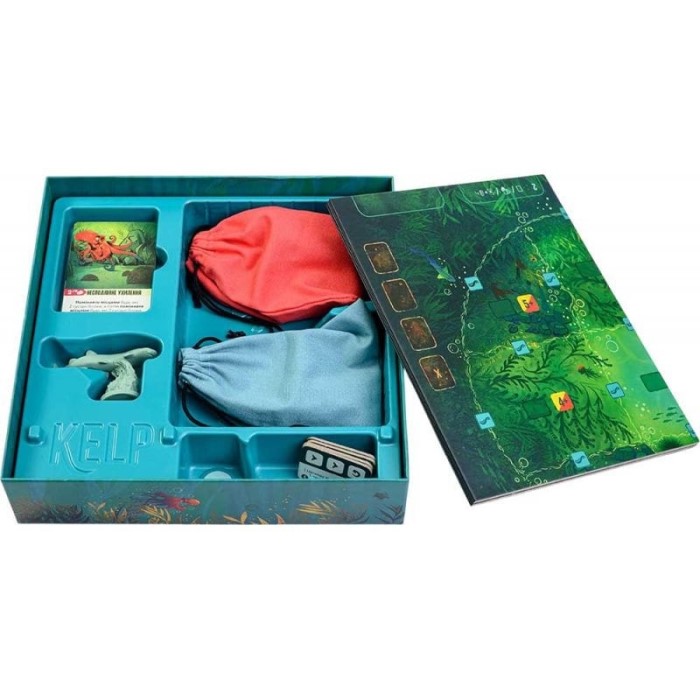
Key Features and Components
Kelp boasts intricate design and gameplay elements that captivate players:
- Stunning Visuals: Detailed underwater artwork sets the tone for an immersive experience.
- Dynamic Board Setup: Game boards are modular, allowing unique layouts for every session.
- Strategic Depth: Players balance resource allocation, territory control, and alliances for victory.
- Customizable Player Roles: Each player assumes distinct roles with specific skills and goals.
- Quality Components: High-end cards, tokens, and miniatures ensure durability and aesthetic appeal.
- Engaging Duration: The game offers sufficient challenge while remaining fast-paced.
These features make Kelp a compelling choice for anyone seeking an engaging strategy board game.
The Theme and Setting of Kelp
A Dive into the Underwater World
Kelp transports players into a vibrant underwater ecosystem. The theme is inspired by marine life and ocean exploration. Players navigate colorful oceanic landscapes, teeming with coral reefs and diverse aquatic creatures. The game’s visuals and components immerse players in a world of underwater adventure. This setting creates a unique atmosphere, making every session feel like a dive into the deep sea.
The detailed artwork plays a crucial role. Each game piece reflects the beauty and complexity of the ocean. Modular boards allow players to experience different underwater terrains. By combining these elements, Kelp offers a truly immersive experience that stands out from other tabletop games.
How the Theme Influences Gameplay
The underwater theme of Kelp shapes the mechanics and strategies players adopt. Resource management reflects ocean life dynamics, such as conserving food and energy. Territory control mirrors marine ecosystems, where species compete for space and resources.
Player roles are heavily tied to the theme. For example, roles may represent ocean explorers or marine species, each with specific abilities. These roles encourage creative thinking and thematic decision-making. Moreover, alliances and conflicts mirror the balance of cooperation and competition found in nature.
The theme also adds layers of storytelling to gameplay. Players feel connected to their roles and objectives, enhancing engagement. This integration of theme and mechanics makes Kelp more than a strategy game—it becomes an underwater adventure.
Rules and Mechanics
Core Gameplay Mechanics
Kelp’s gameplay revolves around dynamic decision-making and resource management. Each player starts with a specific role, offering unique skills and objectives. Roles can represent ocean explorers or marine species, aligning closely with the underwater theme. The game unfolds in turns, with each player making critical moves to achieve their goals.
Key mechanics include:
- Resource Management: Players collect and use resources like food and energy for survival and progress.
- Territory Control: Players strategically claim underwater zones to expand influence and secure vital resources.
- Role-Specific Actions: Each role grants special actions, enabling unique strategies and playstyles.
- Dynamic Board Interaction: Modular boards introduce new terrain challenges, keeping the gameplay fresh.
- Event Cards: Random events add unpredictability, forcing players to adapt their strategies.
These mechanics create an intricate puzzle that challenges players to balance short-term actions and long-term goals.
Strategic Elements to Master
To excel at Kelp board game, players need to master key strategic elements. Success depends heavily on how well players can predict opponents’ moves and adapt to the evolving game state. Here are some crucial elements to focus on:
Planning Ahead
- Anticipate Future Moves: One of the most crucial aspects of strategy in any game is the ability to think several steps ahead. Anticipating your opponents’ future moves requires careful observation of their strategies, tendencies, and goals. By doing this, you can formulate your own plans that either align with your objectives or disrupt theirs.
- Resource Forecasting: Consider not just the immediate resources at your disposal but also the resources you will need in subsequent turns. Identify potential conflicts or areas where resources may become scarce. By planning your moves with foresight, you can maintain an advantage and avoid being caught off guard.
- Creating Contingency Plans: Always have a backup strategy in place. If your initial plan doesn’t unfold as expected due to an opponent’s action or an unfavorable event card, having a contingency plan will allow you to pivot quickly and effectively.
Efficient Resource Allocation
- Strategic Use of Resources: Resources are often limited, making it essential to use them efficiently. Carefully assess which resources are most critical for your current strategy and invest them wisely. Prioritize resources that will provide significant advantages and consider the long-term implications of each allocation.
- Avoiding Shortages: To prevent running out of essential resources, keep an eye on your consumption rates and the actions of your opponents. If you notice that a key resource may become scarce, take proactive steps to either acquire more or adjust your strategy to mitigate the impact of the shortage.
- Leveraging Resources for Critical Actions: When executing critical actions, ensure you’re using the right resources at the right time. Timing can make a significant difference. Utilitarian strategies maximize the effectiveness of your resources by pairing them with pivotal actions that can swing the game in your favor.
Understanding Player Roles
- Learning Role Strengths: In many games, each player or character may have specific roles that come with unique strengths. Spend time understanding what each role can achieve; this knowledge is vital for maximizing your effectiveness and devising successful strategies.
- Identifying Weaknesses: Alongside understanding strengths, recognize the weaknesses inherent in each role. This allows you to create counters when facing opponents. For instance, if an opponent excels in offense but lacks defense, you can leverage defensive strategies to protect your position while striking back.
- Adapting to Player Dynamics: As players move through the game, their strategies and roles may evolve. Stay aware of these changes and adjust your tactics accordingly. This fluidity in understanding roles can provide substantial leverage during critical game moments.
Building Alliances
- Forging Temporary Coalitions: Collaboration can be an incredibly effective tactic in competitive environments. Building alliances with other players can help counter more dominant individuals or teams, ensuring a more level playing field. This cooperation can allow you to pool resources and strengthen your positions against a common threat.
- Strategic Timing for Alliances: When building alliances, choose your partners wisely. Consider their strengths and how well they align with your goals. Instead of forging bonds with the strongest player, you might benefit from aligning with someone whose weaknesses complement your strengths.
- Knowing When to Break Alliances: While alliances can provide temporary advantages, it’s crucial to recognize the right moment to break them. If preserving an alliance compromises your chances of success, be prepared to transition from cooperation to competition. Clear communication can help minimize fallout, but strategic self-interest is often crucial in competitive settings.
Risk Management
- Mitigating Risks from Event Cards: In many board games, random events can change the game landscape significantly. Effectively managing risks associated with event cards requires you to take calculated risks. Evaluate the potential repercussions of each card and prepare contingency plans to mitigate their effects.
- Anticipating Opponent Strategies: Understand that your opponents may also use unexpected strategies to gain the upper hand. Stay alert to their possible moves and how they could impact your plans. Preparing for potential counter-strategies can help you stay ahead of the game.
- Embracing Flexibility: A successful strategy often involves being adaptable and responsive. Maintain a flexible approach to risk management so you can adjust your strategies as new information or game developments arise. This adaptability allows you to seize opportunities and minimize losses against aggressive tactics or unforeseen events.
Mastering these elements will enhance strategic depth and make every win feel earned.
Multiplayer Dynamics
Kelp’s multiplayer mode introduces dynamic interactions, fostering both collaboration and competition among players. The game encourages teamwork yet demands strategic cleverness to outsmart rivals. This dual nature makes multiplayer sessions engaging, unpredictable, and full of surprises.
Collaborating and Competing
In Kelp, players constantly balance between forming alliances and pursuing personal goals. Collaboration can be vital for overcoming in-game challenges or countering a dominant opponent. For instance, players might team up to reclaim a territory or share scarce resources.
However, alliances are fragile and temporary. Individual goals and game mechanics often force players to break alliances. This mix of cooperation and rivalry mirrors real-world ecosystems, where survival often depends on both collaboration and competition. Players must decide when to trust, when to betray, and when to act for self-interest.
The unpredictability of player behavior keeps the game fresh. Alliances form and dissolve, creating dynamic shifts in power. This makes every session unique and thrilling.
Balancing Strategy with Fun
Kelp board game ensures that multiplayer sessions are engaging and enjoyable for all players, regardless of skill. The game strikes a balance by blending strategic depth with casual playability.
- Accessible Rules: Kelp’s mechanics are easy to grasp, reducing confusion for new players.
- Role Diversity: Customized roles allow players to adopt distinct strategies, keeping gameplay varied.
- Event Cards: These introduce randomness, leveling the playing field and offering opportunities for underdogs.
- Short Game Sessions: Games are designed to last a manageable amount of time, keeping players invested.
By focusing on both enjoyment and strategy, Kelp ensures a rewarding multiplayer experience. Whether you’re a casual gamer or a hardcore strategist, there’s something for everyone.
Strategies and Tips for Success
Effective Plans for New Players
Starting Kelp can seem challenging, but a few simple strategies help new players succeed:
- Learn Your Role: Understand your role’s abilities and goals to maximize their effectiveness.
- Prioritize Resources: Always secure essential resources like food and energy before focusing on expansion.
- Stay Flexible: Adapt to the changing board and other players’ strategies to stay competitive.
- Experiment with Alliances: Use temporary partnerships to gain advantages but know when to end them.
- Manage Risks: Avoid aggressive moves early on; build your strategy with care and caution.
By focusing on these basics, beginners can build confidence and remain competitive in the game.
Advanced Tactics for Experienced Gamers
Experienced Kelp players can refine their strategies to outwit opponents and dominate the board:
- Optimize Resource Management: Balance immediate needs with long-term planning for sustainable growth.
- Disrupt Opponents: Use event cards and strategic moves to hinder other players’ progress.
- Control Key Territories: Secure zones that offer valuable resources or strategic advantages.
- Master Role Dynamics: Exploit the strengths of your role while countering others’ tactics.
- Plan for Endgame: Think several moves ahead, positioning yourself for a strong finish.
Advanced players must combine foresight, adaptability, and bold moves to secure victory. These tactics make gameplay more intense and rewarding.
The Appeal of Kelp
Why Players Love the Game
Kelp captivates players by offering a blend of strategy, immersive design, and accessible mechanics. The underwater theme stands out, providing a unique and visually rich experience. Each game session feels like exploring a vibrant aquatic world, keeping players engaged.
The modular board setup adds variety. No two games are the same, offering fresh challenges each time. This randomness ensures replayability and keeps players coming back for more.
Roles in the game encourage creativity. Each player adopts a unique role with defined objectives, shaping gameplay strategies. These roles invite diverse playstyles, allowing both casual and hardcore gamers to enjoy the game.
Kelp’s combination of simple rules and deep strategy is key to its appeal. New players find it easy to learn, while experienced players love mastering the strategic complexities. The balance between unpredictability and control keeps sessions dynamic.
Event cards enhance engagement, adding surprising twists that force players to adapt. These moments create excitement, ensuring every game remains thrilling. The mix of cooperation and competition among players in multiplayer mode adds another layer of fun.
Comparisons with Similar Strategy Games
Kelp differentiates itself from other strategy board games through its underwater theme and design. While many strategic games focus on abstract mechanics or generic settings, Kelp immerses players in a vivid ocean adventure.
Some games emphasize territorial control or resource management but lack thematic depth. Kelp’s gameplay ties these mechanics to its ocean ecosystem theme, enriching the player’s experience. Elements like energy conservation and species competition make strategies more engaging.
Unlike traditional tabletop games, Kelp keeps the layout dynamic with modular boards. This ensures varied terrains and challenges each session, enhancing replayability compared to fixed-board games. Players can explore new strategies based on the changing environment.
The game also strikes a balance between complexity and accessibility. Other games often overwhelm new players with intricate rules. Kelp simplifies the learning curve without sacrificing strategic depth. This makes it an excellent entry point for beginners and a rewarding challenge for experienced gamers.
Overall, Kelp’s thematic immersion, adaptable setup, and strategic gameplay set it apart from its peers.
Expanding Your Experience
Variants and Expansions
The Kelp board game offers opportunities to enhance gameplay through variants and expansions. Variants introduce alternative rules or objectives to add variety. These tweaks can either reduce complexity for casual players or amplify challenges for experienced gamers.
Expansions extend the core game by adding new components, roles, or storylines. They enrich the underwater theme while offering fresh strategies and dynamics. For instance, expansions might include new marine species, resource types, or modular boards. This diversity keeps the game vibrant and ensures long-term enjoyment for players.
Variants and expansions allow the game to evolve based on feedback from the community. Players can customize experiences to match their preferences. Exploring these options broadens creative approaches and fosters deeper engagement.
Community and Organized Play Opportunities
The Kelp board game has a strong community that supports interaction and growth. Local game groups or online forums provide spaces for discussions, tips, and strategies. Sharing experiences inspires players to explore new ways to play the game.
Organized play opportunities, such as tournaments or events, take the experience to another level. These gatherings let players compete, collaborate, and bond with fellow enthusiasts. Game nights or thematic tournaments showcase the social aspect of Kelp.
Community-driven activities, like creating fan-made scenarios, further enrich gameplay. Collaborative storytelling and shared designs make the game feel dynamic and inclusive. The sense of connection keeps players invested, strengthening the broader Kelp ecosystem.
By embracing variants, expansions, and community play, Kelp becomes more than a game—it turns into a shared journey.
